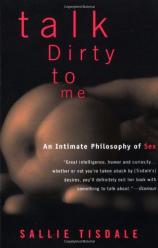Reading Group Guide
Discussion Questions
Talk Dirty to Me

1. "We all pretend to be more of a man or a woman than we secretly suspect we are," Sallie Tisdale quotes a friend as saying. In what ways have you felt not feminine or masculine enough? How did these feelings influence some of your choices in life?
2. "Pervert." "Nice girls don't." These are thoughts that often stop Sallie Tisdale short. Discuss how and where you see evidence of society imposing these values. How much do these cultural proscriptions affect you?
3. It's a lot easier to talk about tolerance than to be tolerant. Does learning about transsexuals, cross-dressers, prostitutes, and other people who may be different from you make you feel more tolerant, or do their differences still make you uncomfortable?
4. Sallie Tisdale describes several friends who decide to change their sex. How much does gender inform or influence how we relate to people? How do you imagine you'd feel if someone you'd been close to decided to change his or her sex? Could you be accepting of this changed person?
5. Many people oppose pornography on the grounds that it objectifies women--some even argue that it leads to violence against women. Why do many people who haven't seen adult films presume that most pornography is violent rather than erotic?
6. Some Americans defending pornography cite the First Amendment, arguing that censorship--any censorship--is a violation of our civil rights. Do you agree? Is protection of the First Amendment invaluable at all costs? Discuss other arenas in which this controversy comes into play.
7. Of the renters of adult videotapes, 59 percent are men alone, 19 percent are women with men, and 15 percent are men with men. Only 6 percent are women alone, and 1 percent are women with women. How much of this difference, do you think, is due to society's strictures as opposed to women's lack of interest in pornography?
8. Sallie Tisdale notes that "the one thing that is consistent in Western history is that any `loose' woman . . .is dangerous and must be controlled." Our society, like most through the ages, approves of a woman "marrying money," but disapproves of a woman having sex for money. It frowns less on the men who visit prostitutes than on the prostitutes themselves. Discuss stereotypical gender roles and how they influence these societal moral judgments.
9. Sallie Tisdale says, "Over the last year, and with considerable surprise, I've come to realize I can't define woman." How would you define what a woman is or what a man is? What aspects of your definition are biological and what aspects are cultural?
10.Talk Dirty to Me is divided into sections--Desire, Arousal, Climax, and Resolution. What do you think the author was trying to accomplish or express by organizing her book in this way? What does the organization of this book say about the development of a conversation, or the process of creativity?
11. "We learn virtually every skill by watching others do them . . . Everything but sex." Do you think children would find it easier to grow up--or be better equipped to deal with their sexuality than previous generations--if they were well-informed about sex and eroticism? Would you give this book to a young adult to read? Why or why not?
12. Do you find the image on the cover of the book erotic? Why or why not? What recurring themes do you find in the media/art/literature as metaphors for eroticism?
13. Sallie Tisdale argues that her "intimate philosophy" is not proscriptive, that "there are five billion sexualities in the world, one for each of us." How has Talk Dirty to Me influenced your own philosophy? Sallie Tisdale also points out that sex is something we all do but few of us talk about. After reading this book, are you more willing to express openly your sexual thoughts and desires?
Talk Dirty to Me
- Publication Date: October 1, 1995
- Paperback: 352 pages
- Publisher: Anchor
- ISBN-10: 0385468555
- ISBN-13: 9780385468558








